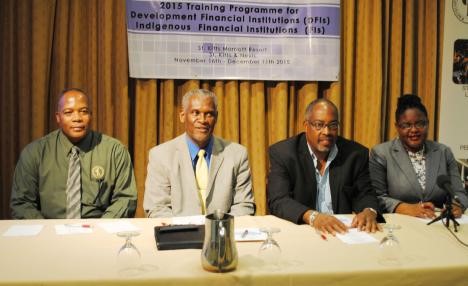CDB underscores role of training in development and other finance institutions
19 de noviembre de 2015
Fuente:
Caribbean News Now

At the opening ceremony of CDB’s Training Programme are from left: Lenworth Harris, General Manager of the Development Bank of St Kitts and Nevis; Analdo Bailey, CEO Eastern Caribbean Institute of Banking, Peter Blackman, CDB’s Portfolio Manager for Private Sector Development Unit; and Deniece Alleyne, Board Member, Development Bank of St Kitts and Nevis. Credits: Caribbean New Now.
Published on November 18, 2015, BASSETERRE, St Kitts. - The Caribbean Development Bank (CDB) perceives investments in human resource development and training as critical enablers to the achievement of national and regional goals for social and economic development.
“CDB also views training as a critical tool for improving the productive capacity within its borrowing member countries (BMCs) as a means of responding to the demands of a competitive and changing social and economic environment,” said CDB’s portfolio manager for private sector development unit, Peter Blackman.
The CDB official made the remarks on Monday in Basseterre, St Kitts, at the opening ceremony of a four-module, four-week, training program organized by the CDB in collaboration with the Development Bank of St Kitts and Nevis for representatives from the development finance institutions, indigenous banks and other finance institutions with whom the CDB over the years has had a direct, or indirect relationship.
Ten participants in the first of the four-module training programs are drawn from five member countries of the Caribbean Development Bank: St Vincent and the Grenadines (2), Grenada (1), Belize (2), Dominica (1), and host country St Kitts and Nevis (4).
Blackman announced that from next week they would be anticipating participants from Suriname, which is the newest Caribbean Development Bank member country, who will be joining such training for the first time.
The first module, ‘Fundamentals of SME Lending’, is being facilitated by Michel Williams, who is the former assistant general manager of National Bank of Dominica, former president of the Dominica Bankers and Financial Institutions Association, former board member of the Caribbean Association of Indigenous Banks, and board member of Caribbean Union Bank.
Williams, who has served on the Eastern Caribbean Central Bank (ECCB) Payments Council and the ECCB Bankers Committee, is a chartered accountant for the past 20 years; entrepreneur of several small and mid-size companies; and lectures banking and finance across the region.
The other modules in this training programme are Credit appraisal with a specific focus on agricultural projects to be targeted at credit staff; enterprise risk management focusing on key techniques to identifying, measuring monitoring and controlling risk of all types within financial institutions and designing of appropriate frameworks; and loan recovery management with specific focus on legal issues to better manage chronic cases of loan default including the maximization of loan recovery.
The opening ceremony of the training programme was chaired by Deniece Alleyne, a board member of the Development Bank of St Kitts and Nevis, and was also addressed by Analdo Bailey, CEO Eastern Caribbean Institute of Banking, who delivered the feature remarks.
“The rationale for CBD’s continued support for training staff of Finance Institutions is based on the recognition of the importance of building capacity within institutions that provide financial services to key economic sectors, and in so doing, contribute to economic development within the Borrowing Member Countries of CDB,” Blackman said.
He noted that access to such training provides an opportunity for participating institutions to benefit from enhanced knowledge, tools and approaches that contribute to enhanced problem solving.
The CDB official stated that in recent times the Bank’s training interventions have focused on a shorter in-country training programme. Three such programmes have since been held. The first one was rolled out in The Bahamas during September 2000, with the last being completed in April 2011 in Antigua and Barbuda, when 97 participants from 12 of CDB’s borrowing member countries representing 21 finance institutions benefited.
Blackman said the CDB expects that the main benefits from the training programme in St. Kitts and Nevis over the next four weeks will be to enhance technical skills that will contribute to improved portfolio management and administration, and more efficient credit enhancement, appraisal and delivery.
“My challenge to you participants is to use the knowledge gained at this training programme wisely and be willing to share it with your work colleagues,” Blackman concluded. “Training gives you the opportunity to stay abreast of new technologies and developments taking place within your professions.
“Continuous learning is a vital tool which employees need to embrace if they are to remain relevant and adaptable to the constantly changing environment that places on-going demands on them through job functions that are no longer static.”